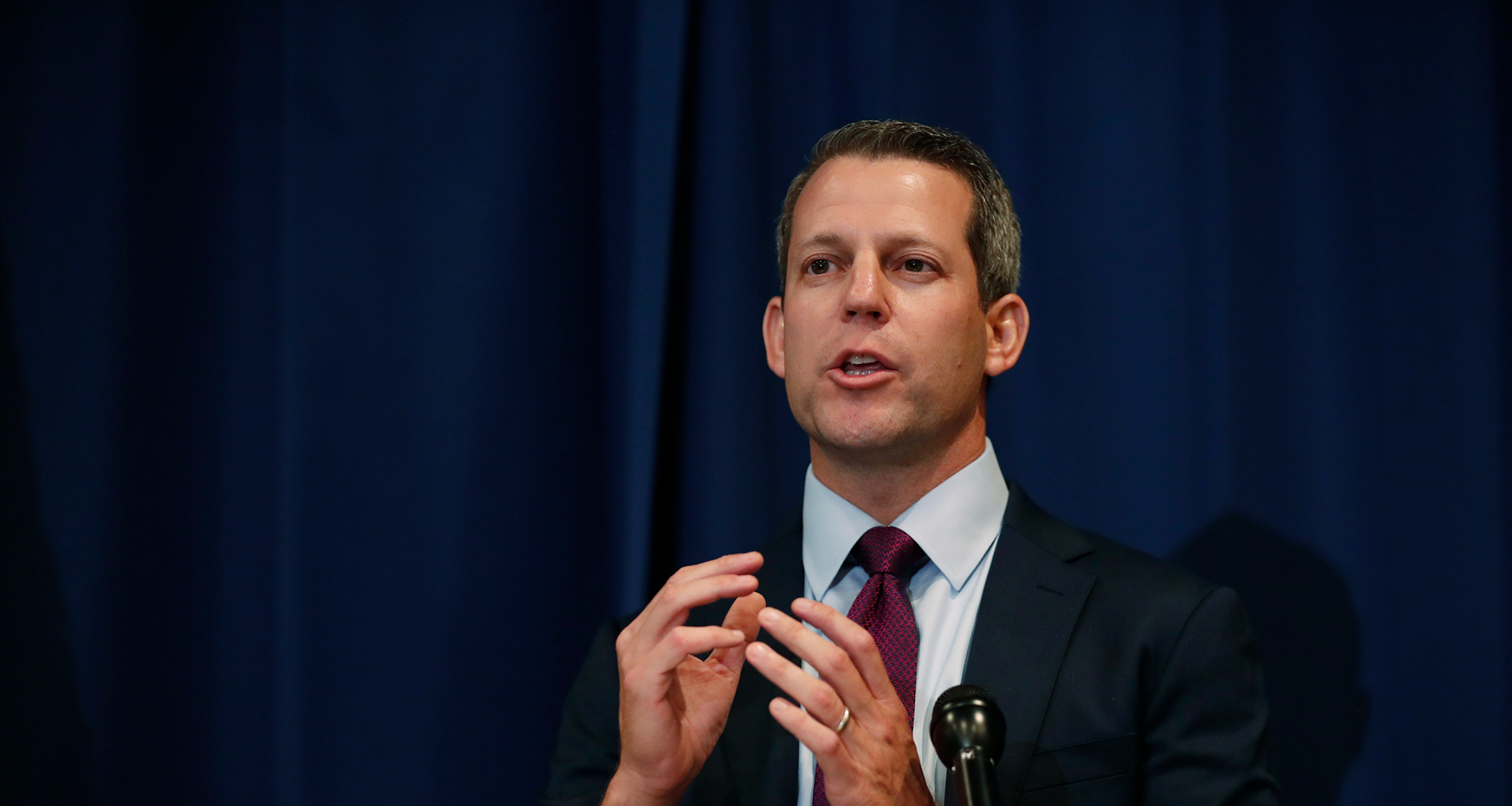Soon after the Supreme Court overturned Roe v. Wade in June of 2022, Tampa attorney Andrew Warren was among more than 90 prosecutors to sign a statement promising to refrain from prosecuting anyone who sought, provided or supported abortions.
Less than six weeks later, Florida Gov. Ron DeSantis suspended the twice-elected Warren—a so-called “progressive prosecutor” who had campaigned on promises to challenge wrongful convictions and seek the death penalty less often.
Warren learned of his suspension while in court supervising the arraignment of two suspects in the 1983 murders of Barbara Grams and Linda Lansen. Investigators in Warren’s office took a new look at those murders after the conviction review unit he established helped exonerate a man who had been wrongly convicted of Lansen’s murder.
DeSantis’ executive order listed several reasons, including Warren’s stance on abortion, as well as a joint statement he signed with more than 70 other elected prosecutors condemning efforts to criminalize transgender people.
“He muzzled free speech, he overturned an election, he broke the law. That's the authoritarian trifecta.” - Andrew Warren
Warren sued in federal court for reinstatement, alleging that the ouster violated his First Amendment right to express his views on matters of public concern, and it also violated Florida’s constitution, which only allows governors to suspend officials for “malfeasance, misfeasance, neglect of duty, drunkenness, incompetence, permanent inability to perform official duties or commission of a felony.”
In January 2023, Judge Robert Hinkle of the U.S. District Court for the Northern District of Florida in Tallahassee ruled the suspension violated Florida law, but also said the 11th Amendment prevented him from intervening over a state-law violation.
Warren is now appealing to the 11th U.S. Circuit Court of Appeals in Atlanta.
“He muzzled free speech, he overturned an election, he broke the law,” Warren says, referring to DeSantis. “That’s the authoritarian trifecta.”
One year after ousting Warren, DeSantis suspended a second prosecutor, Orlando-area State Attorney Monique Worrell, who was elected in 2020. That executive order essentially accused her of being too soft on some defendants. She’s now suing in state court.
DeSantis is hardly the only one targeting progressive prosecutors—a broad term that carries different meanings in different jurisdictions and frequently signals support for policies aimed at reducing mass incarceration.
It’s not just happening in Florida. Georgia and Texas recently passed legislation that could lead to the removal of prosecutors seen as too easy on arrestees, while lawmakers in more than a dozen other states have introduced bills aimed at curbing prosecutors’ discretion.
Critics of these initiatives, such as Mona Sahaf, director of the Vera Institute of Justice’s Reshaping Prosecution, say they threaten to undermine prosecutorial independence by effectively encouraging prosecutors to make decisions based on political considerations, instead of factors like the strength of the evidence or the wishes of the victims.

“No prosecutor has ever charged every case that comes across their dockets,” Sahaf says. “We’re always making decisions based on individual case characteristics.”
“Prosecutors need independence from the governor in order to seek justice,” adds Tina Luongo, chief attorney at the Legal Aid Society’s Criminal Defense Practice, and chair of the ABA Criminal Justice Section.
Opponents also say it’s anti-democratic for a state official to remove an elected local official over policy disagreements.
Laws enabling such removals override local residents’ ability “to determine what public safety should look like in their home communities,” says Josh Rosenthal, legal director at the Public Rights Project, which is challenging the new Georgia law.
While current battles over prosecutorial discretion largely pit conservative governors or Republican-majority legislatures against district attorneys elected by Democratic-leaning cities, there have been occasions when Democrats took issue with prosecutors’ charging practices.
In Georgia, for instance, some Democrats supported a bill that would have created a commission to oversee prosecutors. That measure was proposed partially in response to former Brunswick District Attorney Jackie Johnson’s alleged mishandling of the 2020 fatal shooting of Ahmaud Arbery.
And in the heavily Democratic city of San Francisco, voters recalled progressive prosecutor Chesa Boudin who was accused of being too lenient.
Daniel Richman, a professor at Columbia Law School and a former federal prosecutor, predicts that sheriffs or district attorneys who don’t pursue gun charges could find themselves at odds with governors who support gun control laws.

“Those looking for increased accountability on the part of prosecutors should at least recognize, in the long term, the gains to be had from an additional player looking at the failure to bring cases,” he says.
“That said, the politics of this are horrible,” he adds. “In a world in which, in many states, you have Republican governors and big city prosecutors who are Democrats, the risk—and it’s unavoidable and real—is that each side is going to be using their interaction for political gain.”
While DeSantis’ ouster of Warren was almost certainly triggered by his statement about abortion, the order also cited supposed policies that the governor deemed inappropriate.
For instance, DeSantis alleged that Warren had a policy against prosecuting some defendants, including people stopped for violating the state’s bicycle laws—such as riding at night without a light. DeSantis also alleged that the “only exception” to the bike policy involved defendants who posed direct threats to public safety.
Hinkle said in his ruling that Warren’s policies only set out rebuttable presumptions, not blanket policies.
"The assertion that Mr. Warren neglected his duty or was incompetent is incorrect. This factual issue is not close." —Judge Robert Hinkle
He added that Warren’s bicycle stop policy “explicitly provided” that charges could be filed based on individual circumstances of the case, adding that within two weeks of the policy, charges were brought against a defendant who was initially stopped for a bicycle violation.
“The record includes not a hint of misconduct by Mr. Warren,” Hinkle wrote. “The assertion that Mr. Warren neglected his duty or was incompetent is incorrect. This factual issue is not close.”
Hinkle added that some of DeSantis’ reasons for the suspension—such as Warren’s support for transgender rights—violated the First Amendment, but he said those violations weren’t “essential” to DeSantis’ decision, which Hinkle characterized as politically driven.
“In short, the controlling motivations for the suspension were the interest in bringing down a reform prosecutor—a prosecutor whose performance did not match the governor’s law-and-order agenda—and the political benefit that would result,” Hinkle wrote.

Warren’s lawyers make several arguments at the 11th Circuit, including that his suspension for political reasons is the type of First Amendment violation that entitles him to an injunction.
“The idea that the governor can break federal and state law to suspend an elected official should send shivers down the spine of anyone who cares about the free speech, elections and the rule of law—three core principles of our democracy,” Warren says.
DeSantis’ suspension order against Worrell in Orlando also made claims about her policies as prosecutor. The order alleged that she allowed “serious juvenile offenders to evade incarceration where it would otherwise be appropriate,” and she had “practices or policies of evading minimum mandatory sentences for gun crimes.”
“No prosecutor has ever charged every case that comes across their dockets. We're always making decisions based on individual case characteristics.” —Mona Sahaf
Worrell, who has asked the Florida Supreme Court to reinstate her, argues through her lawyers that the order doesn’t identify any written policy or other statements that would prove DeSantis’ assertions.
“The suspension power is not a limitless ‘take my word for it’ license for the governor to suspend anyone with whom the governor has a policy dispute,” her petition reads. The Florida Supreme Court was scheduled to hear arguments this month.
DeSantis countered that the statistics showed Worrell’s policies weren’t tough enough. For instance, his office wrote, in 2021 and 2022, the Osceola County Sheriff’s Office referred 130 cases involving felons who illegally possessed a firearm to her office, but only five resulted in the minimum mandatory sentence.
Worrell’s attorneys replied in a brief that the “unsubstantiated reporting of referrals” doesn’t itself relate to job performance, adding that referral numbers alone don’t indicate whether the evidence supported the charges, whether the arrest was constitutional or whether other factors played a role in the outcome.
The Florida Sheriffs Association argued in an amicus brief that Worrell’s actions compromised safety.
“Worrell’s practices are inimical to the mission of every sheriff to safeguard their constituents by removing the criminal element from their communities,” the association wrote.
Others, including five former Florida Supreme Court judges and dozens of prosecutors, sided with her in an amicus brief.
“Today’s case presents an abuse of power by a Republican governor attacking a Democratic prosecutor. But if this order is allowed to stand, tomorrow it could be a Democratic governor suspending Republican officials,” they argue, adding, “voters should not fear that their votes for local officials would be rendered meaningless by the political whim of whoever happens to be governor.”
Whether the laws and suspensions targeting prosecutors over their policies are upheld could depend on how state courts interpret their constitutions.
In Georgia, for instance, Fulton County Superior Court Judge Paige Reese Whitaker refused to grant a preliminary injunction blocking the new law, which establishes an eight-member Prosecuting Attorneys Qualifications Commission that can investigate and remove prosecutors.
A bipartisan group of four district attorneys challenged that law, arguing it violates the state constitution and violates the First Amendment by chilling prosecutors’ speech. The challengers also claimed the chilling effects will lead them to refrain from fully disclosing their policies, which could violate their constituents’ First Amendment rights to receive information.
The law itself provides that the commission can remove attorneys for reasons including “a stated policy, written or otherwise, which demonstrates that the district attorney or solicitor general categorically refuses to prosecute any offense or offenses of which he or she is required by law to prosecute.”
The Georgia law also requires the commission to issue standards of conduct and rules, which are supposed to become effective upon review by the state supreme court.
The commission drafted standards and sent them to the state supreme court for review, but the court in late November refused to conduct a review, effectively preventing the commission from moving forward. “We have grave doubts that we have the constitutional power to take any action on the draft standards,” the court wrote. The judges specifically cited concerns regarding the separation of powers.
Georgia lawmakers may respond next year by revising the law to eliminate provisions regarding review by the state supreme court.

In Tennessee, a judge blocked a 2023 law that strips local prosecutors of the ability to handle post-conviction motions by defendants in capital cases.
Death row prisoner Larry McKay said in a post-conviction petition that there was new evidence he was innocent. Shelby County District Attorney Steven Mulroy supported McKay’s petition, but Attorney General Jonathan Skrmetti argued that Mulroy could no longer represent Tennessee in the matter.
Judge Paula Skahan of the 13th Judicial District in Tennessee found that the law stripping Mulroy of power violated Tennessee’s constitution. The state attorney general’s office is appealing.
“The politics of this are horrible.” —Daniel Richman
In Massachusetts, the state’s Supreme Judicial Court also ruled that attempts to interfere with prosecutorial discretion ran afoul of the state constitution. That 2019 ruling stemmed from 36 arrests made in connection with protesters at “straight pride” rally in Boston held on Aug. 31, 2019.
Former Suffolk County District Attorney Rachael Rollins sought to drop charges against some defendants, but Boston Municipal Court Judge Richard Sinnott refused to allow it. Rollins then asked the state’s highest court to require Sinnott to accept her decision about how to proceed.
Rollins, a Democrat, was elected in Suffolk County in 2018, and in 2022 began serving U.S. Attorney for the District of Massachusetts but resigned the following year after two federal reports accused her of alleged ethics violations.
Supreme Judicial Court Justice Frank Gaziano sided with Rollins, ruling that the state constitution’s separation of powers provision (Article 30 of the Massachusetts Declaration of Rights) prohibits the judicial branch from exercising executive powers.
“The prosecutor’s sole authority to determine which cases to prosecute, and when not to pursue a prosecution, has been affirmed repeatedly by this court since the beginning of the nineteenth century,” Gaziano wrote.
See also: Change Agents: A new wave of reform prosecutors upends the status quo (ABA Journal, 2019)